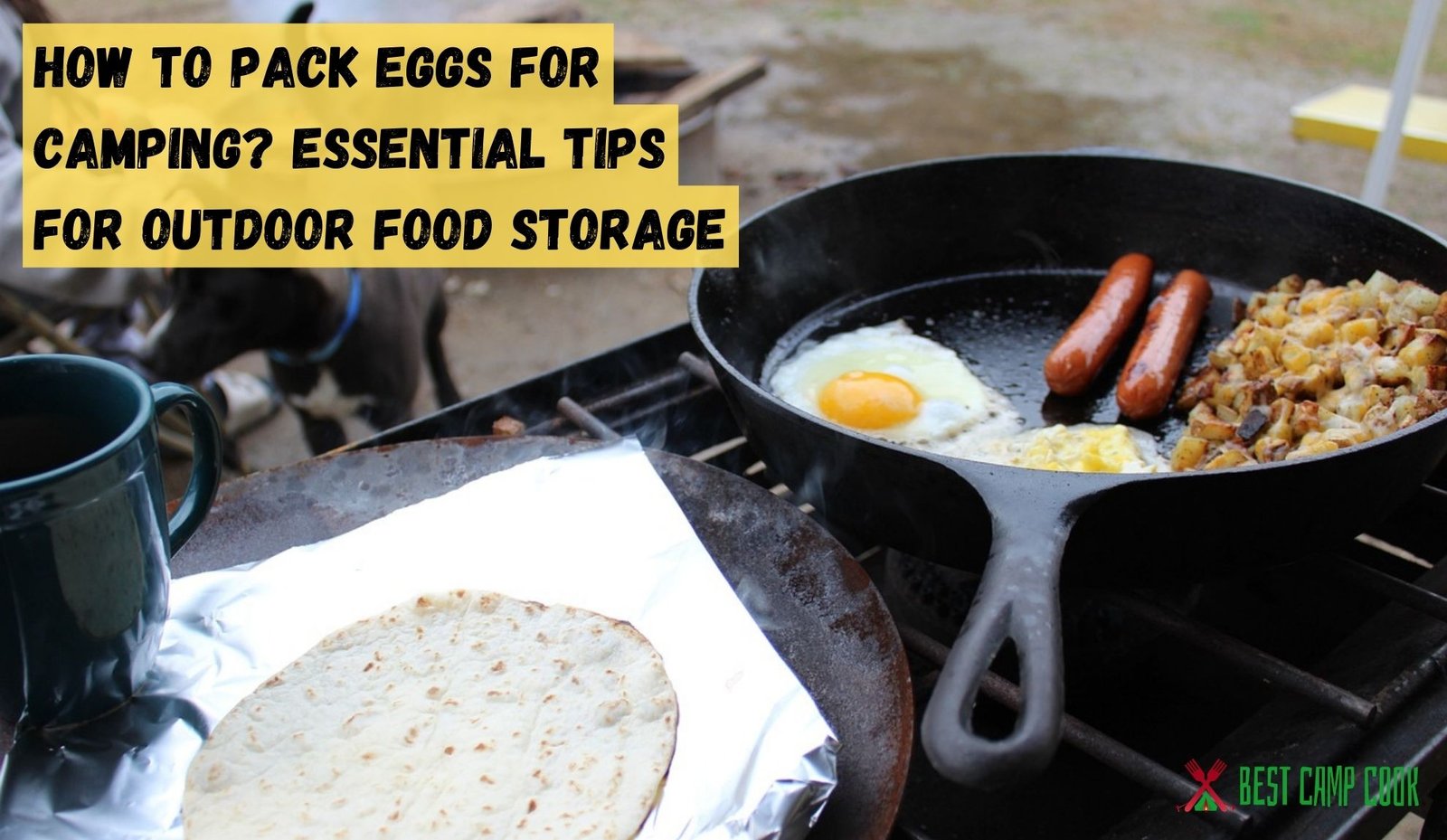Physical Address
304 North Cardinal St.
Dorchester Center, MA 02124
Physical Address
304 North Cardinal St.
Dorchester Center, MA 02124

Hey there, fellow campers! Looking to crack the code on packing eggs for your outdoor escapades? Well, we’ve got just the guide you need: How to pack eggs for camping.
Say goodbye to squished shells and hello to breakfast bliss in the wilderness! With our insider tips and tricks, you’ll be able to transport your eggs without worry. So, whether you fancy a sunny-side-up delight or a fluffy scramble, stick around for the ultimate egg-packing wisdom.
Get ready to impress your camping buddies with your egg-cellent skills. Don’t miss out on this cracking guide that will make your campfire meals even more egg-citing. Let’s dive in and become egg-packing pros in no time!
Main Summary: How to Pack Eggs for Camping?
Whether you prefer whole eggs, pre-scrambled, or liquid form, proper packaging is key. Store them in a sturdy container, insulate them with bubble wrap, and use ice packs to maintain the right temperature. For ultimate convenience, consider pre-cracking and seasoning your eggs or making mason jar omelets and foil packets.
When it comes to camping, packing whole eggs in their shells is a popular choice. It provides convenience and simplicity, but it requires careful handling to prevent breakage.
Start by selecting fresh eggs with intact shells. Avoid using cracked or damaged eggs, as they are more susceptible to contamination and spoilage.
Carefully place the eggs in a sturdy container, such as a plastic egg carton or a hard-sided cooler. The container should provide enough protection to prevent crushing or cracking during transportation.
To add an extra layer of protection, you can wrap each egg individually in a soft material, such as bubble wrap or cloth. This will help cushion the eggs and absorb any impact.
Make sure the container is well-insulated to maintain a consistent temperature. You can use ice packs or frozen water bottles to keep the eggs cool, especially during hot weather.
If you prefer to avoid the risk of breakage or want a more convenient option, there are alternative forms of packing eggs for camping.
Pre-scrambling the eggs and storing them in a leak-proof container is a popular choice for campers. Here’s how to do it:
Another option is to pack liquid eggs, which are already beaten and ready to use. These are available in cartons and can be stored in a cooler or refrigerator. Liquid eggs are convenient and can save you time and effort when cooking at the campsite.
By exploring these different forms of packing eggs for camping, you can choose the method that best suits your preferences and camping needs. Whether you decide to go with whole eggs in their shells, pre-scrambled eggs, or liquid eggs, proper packaging, and storage will ensure you have a delightful and hassle-free culinary experience during your outdoor adventures.

Before embarking on your camping adventure, it’s crucial to understand the best practices for storing eggs to maintain their freshness and prevent any unfortunate mishaps. Here are some effective methods you can employ:
When purchasing eggs for camping, opt for fresh eggs that have not yet reached their expiration date. Look for eggs with intact shells and avoid any cracks or damage. Fresh eggs will have a better chance of staying edible during your trip.
Before you head out to the campsite, it’s recommended to break the eggs and transfer them into a sealable container. This way, you can avoid carrying delicate eggshells that are susceptible to cracking. Breaking the eggs also makes them more convenient to use during cooking, saving you time and effort at the campsite.
Invest in a sturdy and reliable container to transport your eggs safely. You can use a hard-sided cooler or a plastic container with a secure lid. Make sure the container is well-insulated to maintain a consistent temperature and protect the eggs from potential damage.
To minimize the risk of your eggs cracking during transport, provide ample padding within the container. You can use soft materials such as kitchen towels or clothing to create a cushioning layer around the eggs. This additional protection will absorb any shocks or vibrations encountered on the journey.
Maintaining the right temperature is vital for preserving the freshness of your eggs. Ideally, you should store them at a temperature below 40°F (4°C). If you have access to refrigeration, place the container with the eggs in a cooler with ice packs or blocks. If refrigeration is not available, try to keep the container in a shaded and cool area, away from direct sunlight and heat sources.
When storing the eggs, make sure they are placed in an upright position. This orientation helps to keep the yolks centered, preventing them from sticking to the shell and reducing the risk of breakage.

Now that you know how to store your eggs properly, let’s explore some creative ways to prepare them at your campsite. These methods will ensure that you can enjoy a variety of delicious egg-based meals during your outdoor adventure:
To save time and make meal preparation more convenient, consider pre-cracking and seasoning your eggs before your camping trip. Crack the desired number of eggs into a sealable container and add your preferred seasonings. You can include salt, pepper, herbs, or even diced vegetables for added flavor. Mix the eggs and seasonings thoroughly, then store the container in a cooler until you’re ready to use them.
Creating omelets while camping can be a fun and customizable experience. Simply crack a few eggs into a mason jar and add your desired ingredients such as cheese, vegetables, and cooked meat. Secure the lid tightly and shake the jar vigorously to mix the ingredients.
Place the jar in a pot of boiling water, ensuring it is fully submerged. Allow the omelet to cook for about 10 to 15 minutes, depending on the desired doneness. Carefully remove the jar from the water using tongs, let it cool slightly, and enjoy your delicious campsite omelet.
Foil packets are a popular and easy method for cooking eggs while camping. Tear off a large piece of aluminum foil and fold it in half to create a double layer. Shape the foil into a bowl-like form and lightly grease the inside with cooking spray or butter. Crack the eggs directly into the foil bowl and add any desired toppings, such as bacon, cheese, or vegetables.
Carefully seal the foil packet, ensuring it is tightly wrapped. Place the foil packet on a grill grate or directly on the hot coals of your campfire. Cook for approximately 10 to 15 minutes or until the eggs are cooked to your preference. Open the packet carefully to avoid any steam burns, and enjoy your scrumptious campfire eggs.
Using a portable camping stove or grill, a skillet scramble is a classic and straightforward way to cook eggs. Heat a skillet over medium heat and add a small amount of oil or butter to prevent sticking.
Crack the eggs directly into the skillet and scramble them with a spatula. You can enhance the flavor by adding diced vegetables, cheese, or cooked meat. Continue to cook and stir until the eggs reach your desired consistency. Serve the scramble with toasted bread or tortillas for a satisfying and protein-packed camping breakfast.

When planning a camping trip, it’s essential to know how long your food supplies will last, including perishable items like eggs. Understanding the shelf life of eggs while camping ensures that you can enjoy them safely without the risk of foodborne illnesses. Let’s delve into the factors that influence the longevity of eggs during your outdoor adventure.
Several factors determine how long eggs can last while camping:
The freshness of the eggs at the time of purchase plays a significant role in determining their shelf life. Eggs close to their expiration date or past their peak freshness may not last as long as recently laid eggs.
Proper storage conditions are crucial for maintaining egg freshness. Eggs should be stored in a cool and dry place, away from direct sunlight and heat sources. High temperatures can accelerate the deterioration of eggs, reducing their shelf life.
Maintaining a consistent and cool temperature is vital for prolonging the life of eggs. Ideally, eggs should be stored at temperatures below 40°F (4°C). Refrigeration is the best way to achieve this, but if refrigeration is unavailable, placing the eggs in a shaded and cool area will help preserve their freshness.
Eggs are delicate and susceptible to cracking. Rough handling or improper transportation can damage the shells, compromising the eggs’ integrity and reducing their longevity.
Considering the factors mentioned above, eggs can typically last for varying durations while camping:
To ensure the safety and quality of your eggs while camping, it’s recommended to consume them as soon as possible and follow proper storage practices.

When embarking on a camping adventure, it’s essential to know whether eggs require refrigeration. Understanding the need for refrigeration ensures that you can store and consume eggs safely during your outdoor trip. Let’s explore the considerations surrounding the refrigeration of eggs while camping.
Several factors come into play when determining whether eggs need to be refrigerated while camping:
Fresh eggs, particularly those from backyard chickens or farmers’ markets, may have a protective coating called the bloom or cuticle. This natural coating helps seal the pores in the eggshell, reducing the risk of bacterial contamination. Eggs with intact bloom can be stored unrefrigerated for a limited time, provided they are kept in cool and dry conditions.
Temperature fluctuations can affect the safety and quality of eggs. If you’re camping in a region with consistently high temperatures, refrigeration becomes crucial to prevent bacterial growth and spoilage. Additionally, if you’re unsure about the freshness of the eggs or their storage history, refrigeration provides an extra layer of protection.
To ensure the safety and freshness of eggs during your camping trip, consider the following guidelines:

Properly packing eggs for your camping trip is essential to ensure they remain intact, fresh, and safe to consume. In this section, we will explore some additional tips and tricks to help you pack eggs effectively and prevent any unwanted mishaps during your outdoor adventure.
Invest in dedicated egg carriers or cartons designed for camping or outdoor activities. These containers have individual compartments to securely hold each egg, minimizing the risk of cracking or breaking. Egg carriers are typically made of durable materials, providing protection against rough handling and impacts.
To add an extra layer of protection, consider cushioning the eggs within the egg carrier. Place a soft material such as a kitchen towel, paper towels, or even clothing inside the carrier to provide padding and absorb any shock. This helps prevent the eggs from moving around too much and reduces the risk of cracking.
When packing eggs, store them with the pointy end facing downwards. This position helps prevent the yolk from moving and bumping against the shell, reducing the likelihood of breakage.
Ensure you do not overcrowd the egg carrier or container. Leave enough space between each egg to minimize contact and reduce the chance of them hitting against each other. Overpacking can increase the risk of cracking and make it challenging to remove individual eggs without causing damage.
Consider wrapping the egg carrier or carton with an additional protective layer, taking into account your kitchen set up. You can use a kitchen towel, bubble wrap, or a thick layer of clothing to provide insulation and absorb any shocks or impacts. This outer layer adds an extra barrier of protection, especially if the egg container is not exceptionally sturdy.
Try to keep the eggs away from extreme temperatures, both hot and cold. Excessive heat can lead to spoilage, while extreme cold temperatures can cause the eggs to freeze and potentially crack. Keep the egg container in a cool and shaded area, away from direct sunlight or heat sources.
Before packing the eggs, carefully inspect each one for cracks or damage. Discard any eggs with visible cracks as they are more prone to further breakage and can contaminate other eggs in the container.
Store the packed egg container in a cool and dry place, preferably within a cooler or refrigerator if available. Maintaining a stable temperature helps preserve the quality and freshness of the eggs throughout your camping trip.

Cracked eggs can lead to messy and inconvenient situations while camping. To avoid such mishaps and ensure a hassle-free cooking experience, let’s explore some effective strategies to prevent cracked eggs during storage and transportation.
Handle eggs gently and with care. Avoid tossing or dropping them onto hard surfaces, as even minor impacts can result in cracks. Treat the eggs delicately, similar to how you would handle fragile objects.
To minimize the risk of cracked eggs, consider packing them separately from other camping supplies. Avoid placing heavy objects or items that may shift and apply pressure onto the eggs. Keeping them in a dedicated container or cooler prevents accidental crushing or squeezing.
Ensure that the egg container or carton is stable and secure within your backpack or camping gear. Use additional padding or cushioning materials to prevent excessive movement or jostling during transportation. This stabilization reduces the chances of the eggs colliding with each other or the container’s walls.
While traveling to your campsite, try to minimize exposure to rough terrains, bumpy roads, or other situations that could subject the eggs to constant vibrations. These vibrations can contribute to cracking, especially if the eggs are not adequately protected or cushioned.
If possible, plan your meals so that you use the eggs early in your camping trip. The sooner you consume the eggs, the less time they spend in transportation and storage, reducing the risk of accidental damage.
To avoid the concern of cracked eggs altogether, you can opt for alternative egg products while camping. Pre-cracked and liquid egg products or powdered eggs are convenient alternatives that eliminate the risk of dealing with fragile shells.
In the event that you do encounter a cracked egg, handle it with caution and properly dispose of it to prevent any contamination. Additionally, it is essential to maintain good hygiene practices, such as washing dishes properly, to minimize the risk of spreading bacteria or pathogens. Seal the cracked egg in a separate bag or container before disposing of it in a designated waste bin.
To pack eggs for camping, place them in a secure container, such as a plastic egg holder, to prevent cracking. You can also crack the eggs into a sealable container for easier transportation.
For packing eggs in a bag, wrap each egg in a soft cloth or bubble wrap to protect them from impact. Place the wrapped eggs in a sturdy, sealable bag or a container to avoid breakage.
If you’re planning a short camping trip, you can pack fresh eggs. However, for longer trips, consider using dried or powdered eggs, which have a longer shelf life and don’t require refrigeration.
To preserve eggs without refrigeration, coat them in mineral oil or store-bought egg preservatives. This creates a barrier that helps seal the pores in the eggshell, extending their shelf life.
If you have a well-insulated cooler with plenty of ice, eggs can last for up to a week. Ensure the cooler’s temperature is consistently below 40°F (4°C) to maintain the eggs’ freshness.
To transport eggs safely, use a cooler with ice packs to maintain a cool temperature. Alternatively, pack the eggs in a cushioned container and place them in the middle of your camping gear to minimize movement and prevent cracking.